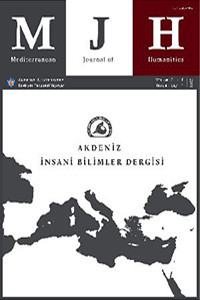Öz
Bu çalışmada Türk sürücülerinin araçtaki otomasyon sistemlerini kabul etme düzeyleri ve bunun olası yordayıcıları olan motivasyon ve bireysel farklılık değişkenleri incelenmiştir. Öz-belirleyicilik kuramı kavramları olan göreli özerklik doğrusu ve genel nedensellik yönelimleri (özerk, kontrol, kişisel olmayan yönelim) ile araçta kabul edilen otomasyon seviyesi arasındaki ilişkiler incelenmiştir. Araç sürmek için daha içsel bir motivasyon ve özerk bir yönelimin kabul edilen otomasyon seviyesiyle olumlu yönlü, dışsal motivasyon ve kişisel olmayan bir yönelimin ise olumsuz yönlü ilişki göstermesi beklenmiştir. Ayrıca genel kontrol odağı ve trafikte kontrol odağı değişkenlerinin araçta kabul edilen otomasyon seviyesi ile ilişkisi incelenmiş ve dışsal kontrol odağının araçta daha yüksek seviyede otomasyonu kabul etme ile olumlu yönlü ilişki göstermesi beklenmiştir. Analizler, yaşları 20 ile 60 arasında değişen 203 (% 49.8 kadın, % 51.2 erkek) katılımcı ile yürütülmüştür. Sonuçlar genel olarak hipotezleri destekleyen bir eğilim göstermiştir ve en güçlü ilişki trafikte kontrol odağının kader boyutuyla kabul edilen otomasyon seviyesi arasındaki pozitif korelasyon bulgusudur.
Anahtar Kelimeler
Sürücü Otomasyon Sistemleri Öz-Belirleyicilik Kuramı Kontrol Odağı Türk Sürücü Örneklemi
Kaynakça
- Arthur W. & Doverspike D. (1992). “Locus of Control and Auditory Selective Attention as Predictors of Driving Accident Involvement: A Comparative Longitudinal Investigation”. Journal of Safety Research 23 (1992) 73-80.
- Bazilinskyy P., Kyriakidis M. & de Winter J. (2015). “An International Crowdsourcing Study into People’s Statements on Fully Automated Driving”. Procedia Manufacturing 3 (2015) 2534-2542.
- Dağ İ. (2002). “Kontrol Odağı Ölçeği (KOÖ): Ölçek Geliştirme, Güvenirlik ve Geçerlik Çalışması”. Türk Psikoloji Dergisi 17 (2002) 77-90.
- Deci E. L. & Ryan R. M. (1985). “The General Causality Orientations Scale: Self-determination in Personality”. Journal of Research in Personality 19 (1985) 109-134.
- Deci E. L. & Ryan R. M. (1987). “The Support of Autonomy and the Control of Behavior”. Journal of Personality and Social Psychology 53 (1987) 1024-1037.
- Deci E. L. & Ryan R. M. (2000). “The “what” and “why” of Goal Pursuits: Human Needs and the Self-determination of Behavior”. Psychological Inquiry 11 (2000) 227-268.
- Deci E. L. (1980). The Psychology of Self-determination. Lexington 1980.
Associations of Self-Determination and Locus of Control with Accepted Level of Automation among Turkish Drivers
Öz
The present study investigated Turkish drivers’ levels of acceptance of automated driving, along with possible motivational and individual differences, and the antecedents of this acceptance. Specifically, the associations of self-determination theory constructs of the relative autonomy continuum and the general causality orientations (i.e., autonomy, control and impersonal orientations) as the motivational factors for the task of driving with the accepted level of automation were examined. A more intrinsic motivation for driving and autonomy orientation were expected to be negatively related to the accepted level of automation, while extrinsic motivation and an impersonal orientation were expected to be positively related to the acceptance of automation. In addition, the relationship of the general locus of control and the traffic locus of control constructs with the accepted level of automation were investigated, and a positive relationship between an external locus of control and accepted level of automation was expected. The analyses were conducted with a sample of 203 drivers (49.8% women, 51.2% men) between the ages of 20 and 60. The results yielded a general trend toward supporting the hypotheses, in addition to low levels of acceptance for this technology, with the strongest association being the positive correlation between the fate dimension of the traffic locus of control and accepted level of automation.
Anahtar Kelimeler
Automated Driving Self-Determination Theory Locus of Control Turkish Driver Sample
Kaynakça
- Arthur W. & Doverspike D. (1992). “Locus of Control and Auditory Selective Attention as Predictors of Driving Accident Involvement: A Comparative Longitudinal Investigation”. Journal of Safety Research 23 (1992) 73-80.
- Bazilinskyy P., Kyriakidis M. & de Winter J. (2015). “An International Crowdsourcing Study into People’s Statements on Fully Automated Driving”. Procedia Manufacturing 3 (2015) 2534-2542.
- Dağ İ. (2002). “Kontrol Odağı Ölçeği (KOÖ): Ölçek Geliştirme, Güvenirlik ve Geçerlik Çalışması”. Türk Psikoloji Dergisi 17 (2002) 77-90.
- Deci E. L. & Ryan R. M. (1985). “The General Causality Orientations Scale: Self-determination in Personality”. Journal of Research in Personality 19 (1985) 109-134.
- Deci E. L. & Ryan R. M. (1987). “The Support of Autonomy and the Control of Behavior”. Journal of Personality and Social Psychology 53 (1987) 1024-1037.
- Deci E. L. & Ryan R. M. (2000). “The “what” and “why” of Goal Pursuits: Human Needs and the Self-determination of Behavior”. Psychological Inquiry 11 (2000) 227-268.
- Deci E. L. (1980). The Psychology of Self-determination. Lexington 1980.
Ayrıntılar
| Birincil Dil | İngilizce |
|---|---|
| Konular | Trafik Psikolojisi |
| Bölüm | Araştırma Makaleleri |
| Yazarlar | |
| Yayımlanma Tarihi | 30 Aralık 2019 |
| Yayımlandığı Sayı | Yıl 2019 Cilt: 9 Sayı: 2 |

